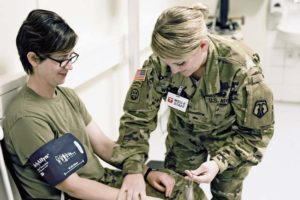
Army Reserve Soldiers from the Medical Support Unit – Europe collaborated with active army personnel to use the medical clinic on Kleber Kaserne Sept. 15 to 16 to facilitate Periodic Health Assessments and dental screenings for reservists during battle assembly.
The MSU-led medical and dental readiness event that supported Army Reserve Soldiers helped increase medical readiness throughout the 7th Mission Support Command, but also strengthened an ongoing relationship with the clinic and the active Army.
The MSU provided all medical supplies and patient administrators for the event, and almost all the health care providers. Two active duty dentists supported the event on both days.
Sgt. Melinda Splane, non-commissioned officer in charge of the event, said the experience of working with the active component to organize the event in their facility was a beneficial experience
“It was a positive experience with very good communication,” she said.
For example, while the MSU brought all their own supplies, if they ran out, the clinic leadership agreed to ensure they could finish the event using the clinic’s supplies, she added.
The event was efficient and the interaction with MSU hosts was good, said Staff Sgt. Paul Trimakas, one of the Soldiers who underwent his PHA at the clinic.
“We are extremely pleased with the event, and that we were able to partner with our active component partners to ensure success of the event,” said Maj. Jonathan Etienne, 7th MSC Office of the Command Surgeon Medical Operations Officer.
Many of the Soldiers come from outside of Germany and the event gave them the opportunity to complete their medical readiness requirements in a limited time. During the weekend, 70 Soldiers completed their yearly PHAs and 58 completed their annual dental examinations.
The event helped ensure that reserve Soldiers have the opportunity to complete their required physical exams during a Battle Assembly weekend, so as not to interfere with their weekday civilian employment requirements, Etienne said.
A voucher system in which Army Reserve Soldiers can complete their PHAs with civilian doctors and dentists is used in the continental United States, however, the number of civilian health care providers is limited in overseas locations.


